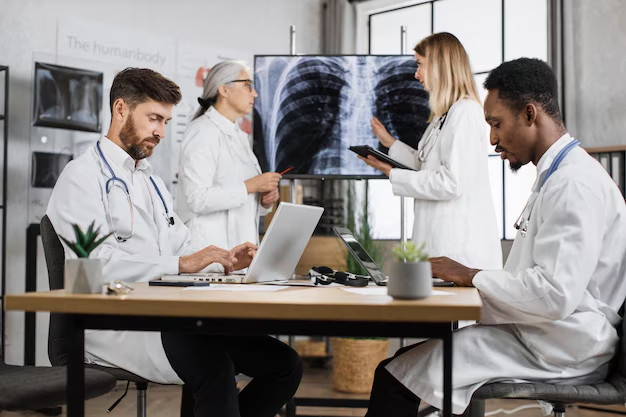Is Pneumonia Contagious? Discover the Truth and Protect Yourself
Pneumonia is a word that tends to create a ripple of worry, especially during the colder months when respiratory illnesses become more common. You may have heard varying opinions on whether pneumonia is contagious and are possibly overwhelmed by information that seems to contradict itself. Let's unravel this mystery and shed light on how pneumonia operates, whether or not it's contagious, and steps you can take to protect yourself and your loved ones.
Understanding Pneumonia: What Is It?
Pneumonia is an infection that inflames the air sacs in one or both lungs, which may fill with fluid, causing a range of symptoms that can vary from mild to severe. While it is most commonly discussed as a singular disease, pneumonia can actually be caused by a wide variety of viruses, bacteria, and fungi.
Types of Pneumonia
Bacterial Pneumonia: Caused by bacteria such as Streptococcus pneumoniae, this type often follows a cold or the flu.
Viral Pneumonia: This can be triggered by influenza, respiratory syncytial virus (RSV), and increasingly in recent years, the coronavirus (SARS-CoV-2).
Mycoplasma Pneumoniae: Sometimes referred to as "walking pneumonia," this type is less severe and may not always require bed rest.
Aspiration Pneumonia: This occurs when you inhale food, drink, vomit, or saliva into your lungs, leading to infection.
Fungal Pneumonia: More common in individuals with weakened immune systems, this is caused by fungi present in soil or bird droppings.
Understanding the type of pneumonia is crucial in determining its contagious nature.
Can Pneumonia Be Contagious?
The aspect of contagiousness largely depends on the source of the infection.
Contagious Types
Viral Pneumonia: Generally, viral pneumonia is contagious. The viruses causing pneumonia often spread via respiratory droplets when an infected person coughs or sneezes. It can also spread through contact with surfaces where these droplets have landed.
Some Bacterial Pneumonia: While bacteria like Streptococcus pneumoniae can spread from person to person, resulting in pneumonia, not all who are exposed will develop the disease. Instead, they may first develop an upper respiratory infection before it potentially progresses.
Mycoplasma Pneumoniae: Known as a mild and less severe form, this type is contagious and spreads via respiratory droplets.
Non-Contagious Types
Aspiration Pneumonia: This type is not contagious as it is caused by inhaling foreign material into the lungs rather than by pathogens spread from person to person.
Fungal Pneumonia: Usually contracted from environmental sources like soil or bird droppings, this type is non-contagious in the traditional sense.
Misconceptions Addressed
It's essential to understand that "pneumonia" refers to the state's condition, not the pathogen, meaning not every mention of pneumonia indicates a contagious condition. Understanding this nuance can help alleviate fears and promote informed conversations about prevention.
How Pneumonia Spreads
Direct Contact
Coughing and Sneezing: Droplets can travel through the air and are inhaled by others, especially in confined spaces.
Surface Contamination: Pathogens can linger on surfaces, making it critical to maintain clean surroundings.
Risk Factors for Transmission
Crowded Spaces: Places with high foot traffic or inadequate ventilation can facilitate the spread of pneumonia-causing pathogens.
Close Contact: Family members and caregivers are more at risk, particularly in cases where viral pneumonia is involved.
Weakened Immune Systems: Individuals with compromised immune systems, the elderly, and very young children are more susceptible to infection.
Preventing the Spread of Pneumonia
Hygiene Practices
Hand Hygiene: Regular and thorough handwashing is crucial, especially after coughing, sneezing, or touching your face.
Respiratory Etiquette: Cover your mouth and nose with a tissue or your elbow when you cough or sneeze.
Surface Disinfection: Regularly clean surfaces with which you and others frequently come into contact.
Vaccination
Pneumococcal Vaccine: Protects against the most common bacterial cause of pneumonia.
Flu Vaccine: As influenza can lead to pneumonia, the flu vaccine is an essential preventive step.
Healthy Lifestyle
Nutrition: A balanced diet bolsters the immune system, making the body better equipped to fend off infections.
Avoid Smoking: Smoking damages lung tissue and impairs respiratory health, increasing susceptibility to infections.
Signs and Symptoms: Recognizing Pneumonia
Common Symptoms
Chest Pain: Pain can occur when you breathe or cough.
Cough: Often producing phlegm or pus.
Fatigue: Strong feeling of tiredness and lack of energy.
Fever and Sweating: Often accompanied by chills.
Shortness of Breath: Especially serious in severe cases.
When to Seek Medical Attention
If you experience difficulty breathing, persistent fever, or worsening symptoms, seek medical evaluation to rule out severe progression or complications.
Caring for Someone with Pneumonia
Supportive Care Tips
Hydration: Encourage plenty of fluids to avoid dehydration.
Rest: Ensure the patient has ample rest for recovery.
Monitor Symptoms: Keep an eye on the progression of symptoms and seek medical advice if they worsen.
Closing Insights: Navigating Pneumonia with Confidence
While pneumonia can certainly be contagious, understanding its various types and transmission routes is key to proactive prevention. Practicing good hygiene, staying updated with vaccinations, and maintaining a healthy lifestyle are effective measures in minimizing risk. Armed with this knowledge, you're better equipped to protect yourself and those around you from this potentially serious illness.
Quick Summary: Pneumonia Essentials 📝
- Pneumonia Types: Bacterial, Viral, Mycoplasma, Aspiration, Fungal.
- Contagious?: Viral, Mycoplasma, and some bacterial pneumonias are contagious.
- Spread: By droplets (coughing/sneezing) and contaminated surfaces.
- Prevention:
- 👐 Hand hygiene
- 💉 Vaccinations
- 🔄 Regular cleaning
- Red Flags:
- Seek help if breathing difficulties or symptoms worsen.
Embrace knowledge and stay vigilant, and remember, with the right precautions, you can significantly reduce the risk of pneumonia. Stay safe and healthy! 🌟

Related Articles
- a Typical Pneumonia
- Can a Cold Turn Into Pneumonia
- Can a Sinus Infection Turn Into Pneumonia
- Can Amoxicillin Cure Pneumonia
- Can Amoxicillin Treat Pneumonia
- Can Baby Oil Cause Pneumonia
- Can Bronchitis Turn Into Pneumonia
- Can Covid Turn Into Pneumonia
- Can Doxycycline Treat Pneumonia
- Can Flu Turn Into Pneumonia
